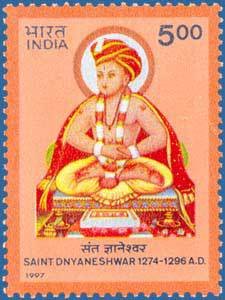A commemorative postage stamp on Dnyaneshwar, a 13th century Marathi saint-poet, authored Dnyaneshwari, the first book to translate Bhagavad Gita from Sanskrit to Marathi language : Issued by India Issued on Mar 5, 1997 Design : The commemorative postage stamp in honour of Saint Dnyaneshwar, has been designed by I.S.P. Nashik, on the basis of artwork provided by Shree Dnyaneshwar Maharaj Sansthan Committee.
Sant Dnyaneshwar also referred to as Jnaneshwar, Jnanadeva, Dnyandev or Mauli or Dnyaneshwar Vitthal Kulkarni (1275–1296),as a 13th-century Indian Marathi saint, poet, philosopher and yogi of the Nath Shaiva and Varkari tradition. In his short life of 21 years, he authored Dnyaneshwari (a commentary on the Bhagavad Gita) and Amrutanubhav.These are the oldest surviving literary works in the Marathi language, and considered to be milestones in Marathi literature.Sant Dnyaneshwar's ideas reflect the non-dualistic Advaita Vedanta philosophy and an emphasis on Yoga and bhakti towards Vithoba, an incarnation of Lord Vishnu.[6] His legacy inspired saint-poets such as Eknath and Tukaram, and he is one of the founders of the Varkari (Vithoba-Krishna) Bhakti movement tradition of Hinduism in Maharashtra.Dnyaneshwar undertook samadhi at Alandi in 1296 by entombing himself in an underground chamber.










